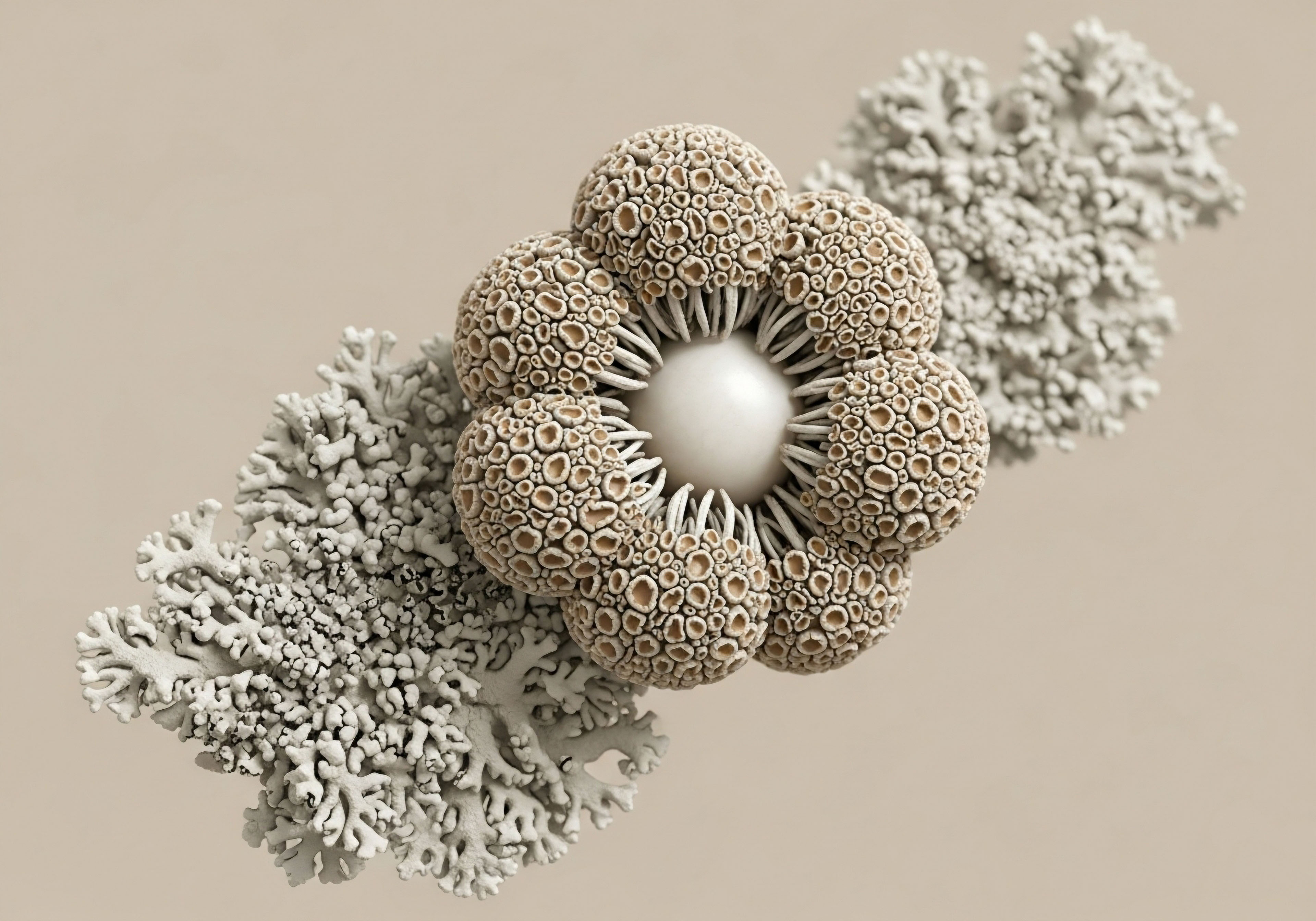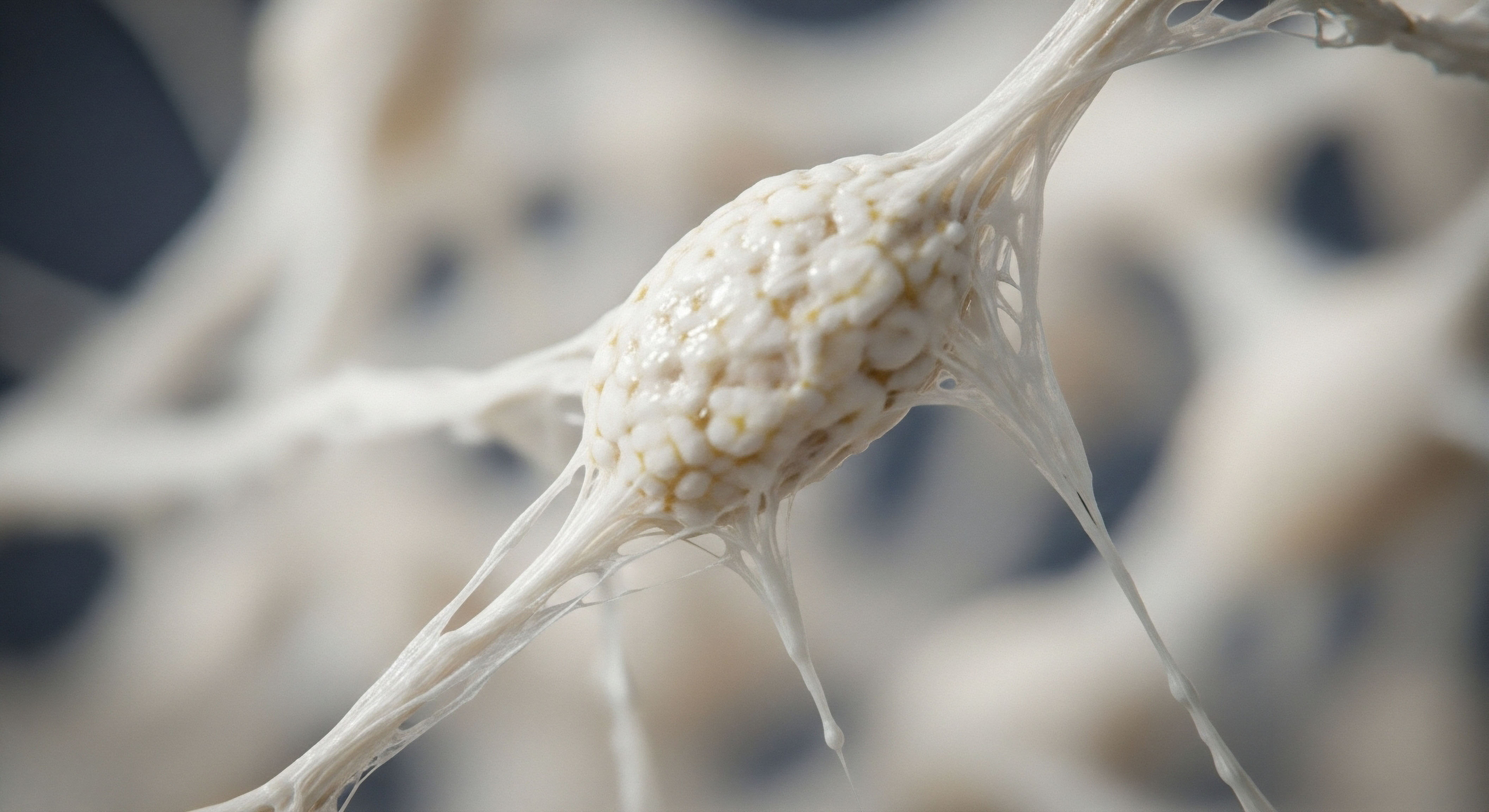

Fundamentals
Perhaps you have noticed a subtle shift, a quiet alteration in the way your mind operates. It might be a fleeting moment of forgetfulness, a slight hesitation in recalling a name, or a diminished sharpness that was once a hallmark of your daily interactions.
These experiences, often dismissed as simply “getting older,” can stir a deep sense of unease. You are not alone in observing these changes; countless individuals grapple with similar feelings, wondering if these are merely inevitable aspects of passing years or if something more profound is at play within their biological systems. This internal questioning, this desire to understand the mechanisms behind such shifts, marks the beginning of a truly personal health journey.
Your body is an intricate network of communication, a symphony of signals orchestrated by chemical messengers known as hormones. These powerful substances, produced by endocrine glands, travel through your bloodstream, influencing nearly every cell and system. They dictate not only physical attributes but also the very landscape of your thoughts, emotions, and cognitive abilities.
When this delicate hormonal balance begins to waver, particularly as we age, the effects can ripple throughout your entire being, touching areas you might not immediately connect to endocrine function, such as the clarity of your thinking or the resilience of your memory.
Consider the role of testosterone, a hormone often associated primarily with male reproductive health. Its influence extends far beyond that, acting as a vital regulator across numerous physiological processes in both men and women. As years accumulate, a natural decline in testosterone levels often occurs.
This reduction is not merely a statistical observation; it translates into tangible changes in how you feel and function. For men, this decline can manifest as reduced energy, decreased muscle mass, shifts in mood, and a noticeable blunting of mental acuity. Women, too, experience the impact of diminishing testosterone, which can contribute to fatigue, changes in body composition, and alterations in cognitive processing.
Hormonal balance is a foundational element of cognitive vitality, influencing mental sharpness and emotional well-being.
The brain, a highly metabolically active organ, relies heavily on a stable internal environment to perform its complex tasks. Hormones provide a significant part of this stability. Testosterone, for instance, plays a part in maintaining neural structure and connectivity.
Research indicates it can influence the size and complexity of neurons, promoting the growth of dendrites and increasing the density of dendritic spines, which are critical for synaptic plasticity and effective neuronal communication. These structural elements are the very scaffolding upon which your thoughts, memories, and learning capabilities are built. When this scaffolding is compromised, even subtly, the cognitive shifts you experience become understandable.
Understanding these foundational biological concepts provides a framework for addressing your concerns. The symptoms you experience are not simply random occurrences; they are often signals from a system seeking equilibrium. By exploring the interconnectedness of your endocrine system with your brain health, we begin to chart a course toward reclaiming vitality. This journey involves recognizing that age-related changes are not always irreversible and that targeted interventions, grounded in scientific understanding, can support your body’s innate capacity for optimal function.

How Do Hormones Influence Brain Function?
The brain is not an isolated entity; it is deeply integrated with the body’s hormonal messaging system. Hormones act as chemical messengers, transmitting signals that regulate a vast array of brain functions, from mood and sleep to memory and learning.
For example, sex hormones like testosterone and estrogen have receptors widely distributed throughout the brain, particularly in regions critical for cognition, such as the hippocampus and prefrontal cortex. The hippocampus is central to memory formation and spatial navigation, while the prefrontal cortex governs executive functions like decision-making, planning, and problem-solving.
When hormonal levels are optimal, these brain regions function with greater efficiency. Testosterone, specifically, has been shown to support neuronal survival and reduce inflammation within the brain. It can also influence neurotransmitter systems, which are the chemical pathways responsible for transmitting signals between brain cells. A balanced hormonal environment contributes to a more resilient brain, better equipped to handle the demands of daily life and resist the degenerative processes associated with aging.

The Hypothalamic-Pituitary-Gonadal Axis and Cognitive Health
At the core of hormonal regulation lies the Hypothalamic-Pituitary-Gonadal (HPG) axis, a sophisticated feedback loop that controls the production of sex hormones. The hypothalamus, located in the brain, releases gonadotropin-releasing hormone (GnRH), which signals the pituitary gland to produce luteinizing hormone (LH) and follicle-stimulating hormone (FSH). These gonadotropins then stimulate the gonads (testes in men, ovaries in women) to produce testosterone, estrogen, and progesterone. This intricate system ensures that hormone levels are tightly regulated.
With advancing age, the efficiency of the HPG axis can diminish, leading to a gradual decline in gonadal hormone production. This dysregulation is not merely a peripheral event; it has direct implications for brain health. The brain itself contains receptors for these hormones, and their fluctuating or declining levels can impact neuronal function, synaptic plasticity, and overall cognitive performance.
Observational studies have consistently shown an association between lower baseline testosterone concentrations and a higher incidence of dementia, including Alzheimer’s disease, in middle-aged to older men. This connection underscores the systemic nature of hormonal health and its profound influence on cognitive longevity.
Understanding the HPG axis helps us appreciate that addressing hormonal imbalances is not about simply boosting a single hormone. It involves considering the entire feedback system and how various interventions might support its optimal function. This holistic perspective is vital for developing personalized wellness protocols that genuinely address the root causes of age-related cognitive shifts.


Intermediate
Once we recognize the profound connection between hormonal balance and cognitive vitality, the conversation naturally shifts toward actionable strategies. This involves exploring specific clinical protocols designed to recalibrate the endocrine system, thereby supporting overall well-being and potentially mitigating age-related cognitive changes. These protocols are not one-size-fits-all solutions; they are tailored interventions, grounded in a deep understanding of individual physiology and clinical evidence.
Testosterone Replacement Therapy, often referred to as TRT, stands as a primary intervention for individuals experiencing symptoms of low testosterone. The goal of TRT extends beyond merely addressing libido or muscle mass; it aims to restore a more youthful hormonal environment that can positively influence mood, energy, and cognitive function.
For men, a standard protocol often involves weekly intramuscular injections of Testosterone Cypionate, typically at a concentration of 200mg/ml. This method provides a steady release of the hormone, helping to maintain stable levels.
A comprehensive TRT protocol for men frequently includes additional medications to optimize outcomes and manage potential side effects. For instance, Gonadorelin, administered via subcutaneous injections twice weekly, is often incorporated to stimulate the body’s natural production of testosterone and preserve fertility.
This approach helps to maintain the integrity of the HPG axis, preventing complete suppression of endogenous hormone synthesis. Another common addition is Anastrozole, an oral tablet taken twice weekly, which acts as an aromatase inhibitor. Its purpose is to block the conversion of testosterone into estrogen, thereby reducing estrogen levels and minimizing potential side effects such as gynecomastia or fluid retention.
In some cases, Enclomiphene may also be included to specifically support luteinizing hormone (LH) and follicle-stimulating hormone (FSH) levels, further promoting testicular function.
Personalized hormonal optimization protocols aim to restore systemic balance, supporting cognitive health and overall vitality.
Women also experience the effects of declining testosterone, which can contribute to symptoms like irregular cycles, mood fluctuations, hot flashes, and diminished libido. For women, testosterone optimization protocols are carefully calibrated to their unique physiological needs. A typical approach involves weekly subcutaneous injections of Testosterone Cypionate, but at much lower doses, often 10 ∞ 20 units (0.1 ∞ 0.2ml). This precise dosing ensures therapeutic benefits without inducing unwanted androgenic side effects.
In female hormone balance, Progesterone plays a central role, with its prescription guided by menopausal status. For peri-menopausal and post-menopausal women, progesterone supplementation is vital for uterine health and can also contribute to improved sleep and mood. Some women may also opt for Pellet Therapy, which involves the subcutaneous insertion of long-acting testosterone pellets.
This method offers sustained hormone release over several months, reducing the frequency of administration. When appropriate, Anastrozole may also be used in women to manage estrogen levels, particularly if there is a concern about excessive aromatization of testosterone.

Can Testosterone Therapy Improve Cognitive Function?
The question of whether testosterone therapy can directly improve cognitive function, particularly in the context of preventing neurodegenerative conditions, is a subject of ongoing clinical investigation. While observational studies suggest a link between lower testosterone levels and increased risk of cognitive decline, interventional studies have yielded mixed results.
Some smaller trials have shown promising improvements in specific cognitive domains, such as spatial memory and verbal memory, in men with low testosterone and mild cognitive impairment or Alzheimer’s disease. For example, one study found that testosterone supplementation improved spatial memory and constructional abilities in men with Alzheimer’s disease or mild cognitive impairment.
However, larger, more comprehensive meta-analyses have often reported no significant overall improvement in cognitive function across various domains with testosterone supplementation. These discrepancies may stem from differences in study design, patient populations, baseline testosterone levels, duration of treatment, and the specific cognitive assessments used. It is important to recognize that cognitive decline is a complex process, and while hormonal balance is a contributing factor, it is rarely the sole determinant.
The mechanisms by which testosterone might exert neuroprotective effects are multifaceted. It is believed to influence neural morphology, enhance synaptic plasticity, and reduce oxidative stress and neuroinflammation. For instance, dihydrotestosterone (DHT), a potent metabolite of testosterone, has demonstrated anti-neuroinflammatory and neuroprotective effects by suppressing inflammatory pathways in the brain. This suggests that while direct prevention of neurodegenerative conditions through TRT remains an area of active research, optimizing testosterone levels may contribute to a more resilient brain environment.

Protocols for Post-TRT or Fertility Stimulation
For men who have discontinued TRT or are actively trying to conceive, a specialized protocol is implemented to restore natural testosterone production and support fertility. This approach aims to reactivate the suppressed HPG axis. The protocol typically includes a combination of medications ∞
- Gonadorelin ∞ Used to stimulate the pituitary gland, encouraging the release of LH and FSH, which in turn signal the testes to resume testosterone production and spermatogenesis.
- Tamoxifen ∞ A selective estrogen receptor modulator (SERM) that blocks estrogen’s negative feedback on the hypothalamus and pituitary, thereby increasing LH and FSH secretion.
- Clomid (Clomiphene Citrate) ∞ Another SERM that works similarly to Tamoxifen, promoting the release of gonadotropins and stimulating endogenous testosterone production.
- Anastrozole (optional) ∞ May be included if estrogen levels become excessively high during the recovery phase, to prevent estrogenic side effects and maintain a favorable testosterone-to-estrogen ratio.
This carefully managed transition helps individuals regain their natural hormonal rhythm, supporting both general well-being and reproductive goals. The goal is to gently nudge the body’s own systems back into optimal function, rather than relying solely on exogenous hormone administration.

Growth Hormone Peptide Therapy
Beyond traditional hormone replacement, Growth Hormone Peptide Therapy offers another avenue for supporting cellular health, anti-aging, and potentially cognitive function. These peptides are not growth hormone itself, but rather secretagogues that stimulate the body’s own pituitary gland to produce and release more growth hormone. This endogenous production is often preferred due to its more physiological release pattern.
Growth hormone and its downstream mediator, Insulin-like Growth Factor 1 (IGF-1), have wide-ranging effects throughout the body, including the brain. They are known to exert trophic effects on neuronal regeneration, stimulate protein synthesis in neurons and glial cells, and favor neuronal survival by inhibiting apoptosis. These actions are highly relevant to maintaining brain health and resilience against age-related decline.
Key peptides utilized in these protocols include ∞
- Sermorelin ∞ A growth hormone-releasing hormone (GHRH) analog that stimulates the pituitary to release growth hormone. It has a short half-life, mimicking the pulsatile release of natural GHRH.
- Ipamorelin / CJC-1295 ∞ Often used in combination, Ipamorelin is a selective growth hormone secretagogue, while CJC-1295 is a GHRH analog with a longer half-life. Their combined action provides a sustained increase in growth hormone levels.
- Tesamorelin ∞ A GHRH analog specifically approved for reducing visceral fat in HIV-associated lipodystrophy, but also studied for its potential cognitive benefits.
- Hexarelin ∞ Another growth hormone secretagogue that also has cardioprotective properties.
- MK-677 (Ibutamoren) ∞ An oral growth hormone secretagogue that increases growth hormone and IGF-1 levels.
These peptides are typically administered via subcutaneous injections, often before bedtime to align with the body’s natural pulsatile release of growth hormone. The benefits reported by active adults and athletes include improved body composition (muscle gain, fat loss), enhanced sleep quality, and a general sense of revitalization. While direct evidence for preventing neurodegenerative conditions with these specific peptides is still emerging, their role in supporting neuronal health and reducing inflammation suggests a promising avenue for comprehensive wellness strategies.

Other Targeted Peptides for Holistic Wellness
Beyond growth hormone secretagogues, other targeted peptides address specific aspects of health that indirectly support cognitive function and overall vitality. These compounds represent a frontier in personalized wellness, offering precise biological signaling to address various physiological needs.
One such peptide is PT-141 (Bremelanotide), primarily used for sexual health. It acts on melanocortin receptors in the brain, influencing sexual desire and arousal. While its direct link to neurodegenerative conditions is not established, sexual health is an integral component of overall quality of life and psychological well-being, which in turn influences cognitive resilience. Addressing such aspects contributes to a more complete picture of health.
Another notable peptide is Pentadeca Arginate (PDA). This compound is gaining recognition for its potential in tissue repair, healing processes, and modulating inflammation. Chronic inflammation is a significant contributor to many age-related conditions, including neurodegenerative processes. By supporting the body’s natural healing mechanisms and dampening excessive inflammatory responses, PDA could indirectly contribute to a healthier internal environment for brain function.
The ability of peptides to target specific pathways offers a sophisticated approach to supporting the body’s intrinsic capacity for repair and balance.
The integration of these various peptides into a personalized wellness protocol reflects a systems-based approach to health. It acknowledges that optimal function in one area often supports optimal function in another, creating a synergistic effect that aims to restore the body’s innate intelligence and recalibrate its systems for sustained vitality.


Academic
The exploration of testosterone therapy’s potential to prevent neurodegenerative conditions in aging individuals requires a deep dive into the intricate world of endocrinology and systems biology. This is not a simple cause-and-effect relationship; rather, it involves a complex interplay of hormonal axes, metabolic pathways, and neurotransmitter systems, all contributing to the delicate balance of brain health.
Our aim is to dissect these mechanisms with scientific precision, translating complex clinical science into a coherent understanding of how these biological forces shape cognitive longevity.
At the cellular level, testosterone and its metabolites exert their influence through various mechanisms. The brain is not merely a passive recipient of hormones from peripheral circulation; it actively synthesizes neurosteroids, including testosterone, within its own tissues. This local production suggests a finely tuned system where brain cells can regulate their hormonal environment independently to some extent.
Androgen receptors, which bind testosterone and dihydrotestosterone (DHT), are widely distributed throughout the brain, particularly in regions vital for cognitive function such as the hippocampus, prefrontal cortex, and amygdala. The presence of these receptors indicates that testosterone directly modulates neuronal activity and survival.
One significant mechanism involves testosterone’s role in maintaining synaptic plasticity, the ability of synapses (connections between neurons) to strengthen or weaken over time in response to activity. This process is fundamental to learning and memory. Studies have shown that testosterone can increase the density of dendritic spines, the small protrusions on dendrites that receive synaptic inputs, thereby enhancing neural communication.
It also supports neurogenesis, the formation of new neurons, particularly in the hippocampus, a region critical for memory. A robust capacity for neurogenesis and synaptic plasticity is considered a hallmark of a healthy, resilient brain, capable of adapting to new information and resisting age-related decline.
Testosterone’s influence on brain health extends to cellular and molecular levels, supporting neuronal structure and function.

Testosterone and Neuroinflammation
Chronic low-grade inflammation within the brain, often termed neuroinflammation, is increasingly recognized as a significant contributor to the pathogenesis of neurodegenerative diseases like Alzheimer’s and Parkinson’s. Microglia, the resident immune cells of the brain, play a central role in this inflammatory response. While acute microglial activation is protective, chronic activation can lead to the release of pro-inflammatory cytokines and reactive oxygen species, damaging neurons.
Testosterone, particularly its metabolite DHT, has demonstrated potent anti-inflammatory properties in the central nervous system. Research indicates that DHT can inhibit the release of pro-inflammatory factors such as TNF-α, IL-1β, and IL-6 from activated microglia.
This occurs by suppressing key signaling pathways, including the TLR4-mediated NF-κB and MAPK p38 pathways, which are central to inflammatory responses. By modulating microglial activity and reducing the inflammatory burden, testosterone may create a more neuroprotective environment, potentially slowing the progression of neurodegenerative processes. This anti-inflammatory action is a critical aspect of testosterone’s broader impact on brain health.

Oxidative Stress and Neuronal Resilience
Another critical factor in neurodegeneration is oxidative stress, an imbalance between the production of reactive oxygen species and the body’s ability to detoxify them. Neurons are particularly vulnerable to oxidative damage due to their high metabolic rate and lipid-rich membranes. Accumulation of oxidative damage can lead to neuronal dysfunction and death.
Testosterone has been implicated in mitigating oxidative stress within the brain. It may exert antioxidant effects, directly scavenging free radicals or upregulating endogenous antioxidant defense systems. For example, some studies suggest that testosterone can enhance the expression of SIRT1, a protein involved in cellular stress resistance and longevity, by improving endothelial nitric oxide synthase (eNOS) activity in aging vascular endothelial cells.
This cascade of events can inhibit the aging of endothelial cells, which in turn supports neuronal health and slows cognitive decline. The ability of testosterone to bolster the brain’s defenses against oxidative damage contributes to its potential neuroprotective role.

The Amyloid Hypothesis and Testosterone’s Influence
In Alzheimer’s disease, the accumulation of amyloid-beta (Aβ) peptides and the formation of neurofibrillary tangles (composed of tau protein) are central pathological hallmarks. The “amyloid hypothesis” posits that Aβ accumulation is a primary driver of the disease. Emerging research suggests that testosterone may influence Aβ metabolism. Animal models have demonstrated that testosterone can reduce the production of Aβ, improve synaptic signaling, and counteract neuronal death associated with amyloid pathology.
While direct human clinical trial evidence specifically linking TRT to reduced Aβ plaque burden or prevention of Alzheimer’s onset is still limited and requires more extensive investigation, the mechanistic insights from preclinical studies are compelling. The potential for testosterone to modulate Aβ processing adds another layer of complexity to its neuroprotective profile, suggesting a role beyond general neuronal support.

Clinical Evidence and Methodological Challenges
Despite the compelling mechanistic evidence, translating these findings into definitive clinical recommendations for preventing neurodegenerative conditions with testosterone therapy remains a challenge. Clinical trials investigating the effects of testosterone supplementation on cognitive function in aging men have yielded inconsistent results.
A significant meta-analysis of randomized controlled trials on testosterone supplementation and cognitive functioning in men found conflicting conclusions. This variability can be attributed to several methodological differences ∞
- Baseline Testosterone Levels ∞ Studies include men with varying degrees of hypogonadism or even eugonadal men, which can influence responsiveness to therapy.
- Dosing and Administration ∞ Differences in testosterone dosage, type (e.g. cypionate, enanthate, gels), and route of administration (intramuscular, transdermal) can affect pharmacokinetics and brain exposure.
- Duration of Treatment ∞ Many trials are relatively short-term (e.g. 6 weeks to 1 year), which may be insufficient to observe significant changes in neurodegenerative processes that unfold over decades.
- Cognitive Assessment Tools ∞ The specific neuropsychological tests used to measure cognitive function vary widely, making comparisons across studies difficult. Some tests may be more sensitive to subtle changes than others.
- Patient Heterogeneity ∞ The presence of underlying cognitive impairment (e.g. mild cognitive impairment, Alzheimer’s disease) at baseline can influence outcomes. Some studies suggest benefits are more apparent in those with existing impairment.
The table below summarizes some of the observed effects of testosterone therapy on cognitive domains in various studies ∞
| Cognitive Domain | Observed Effect with TRT | Supporting Evidence (Example) |
|---|---|---|
| Spatial Memory | Improvements noted in some studies, particularly in men with low T and cognitive impairment. | Cherrier et al. (2005) |
| Verbal Memory | Mixed results; some studies show improvement, others no significant change. | Cherrier et al. (2003, 2005) |
| Executive Function | Inconsistent findings; some improvements in attention and executive function reported. | Kenny et al. (2002) |
| Global Cognition | Generally no significant overall improvement in large meta-analyses. | Zhang et al. (2025), Hong et al. (2025) |
These findings underscore the need for larger, long-term, well-designed randomized controlled trials with standardized methodologies to definitively ascertain the role of testosterone therapy in preventing or slowing neurodegenerative conditions. The complexity of brain aging and the multifactorial nature of neurodegenerative diseases mean that hormonal optimization is likely one piece of a larger, integrated wellness strategy.

Growth Hormone Peptides and Neuroregeneration
The realm of growth hormone peptides offers another compelling area of research for neurodegenerative conditions. Growth hormone (GH) and Insulin-like Growth Factor 1 (IGF-1) are known to have significant neurotrophic and neuroregenerative effects. They stimulate protein synthesis in various brain cells, including neurons, glia, oligodendrocytes, and Schwann cells, and actively promote neuronal survival by inhibiting programmed cell death (apoptosis).
IGF-1, in particular, is crucial for promoting organized adult hippocampal neurogenesis, contributing to the development and maturation of new neurons, myelination (the formation of the protective sheath around nerve fibers), and enhanced resistance to injury. Dysregulation of the GH/IGF-1 axis is observed in many neurodegenerative diseases, including Amyotrophic Lateral Sclerosis (ALS), where patients often exhibit lower GH/IGF-1 ratios in cerebrospinal fluid and plasma.
Growth hormone secretagogues (GHS), such as Sermorelin, Ipamorelin, and CJC-1295, work by stimulating the body’s own GH release. These peptides have demonstrated neuroprotective and anticonvulsant effects in experimental models. While direct clinical evidence for their role in preventing neurodegenerative conditions in humans is still in its early stages, their ability to support neuronal health, reduce inflammation, and promote neurogenesis positions them as promising adjunctive therapies within a comprehensive wellness protocol. The focus here is on supporting the brain’s intrinsic repair and maintenance mechanisms, rather than a direct cure.

Metabolic Health and Brain Aging
The connection between metabolic health and brain aging is increasingly recognized as fundamental. Conditions such as insulin resistance, type 2 diabetes, and metabolic syndrome are significant risk factors for cognitive decline and neurodegenerative diseases. The brain is a highly energy-dependent organ, and disruptions in glucose metabolism can severely impair its function.
Testosterone plays a role in metabolic regulation, influencing insulin sensitivity, glucose uptake, and fat metabolism. Low testosterone levels are often associated with increased visceral adiposity and insulin resistance, creating a pro-inflammatory and pro-oxidative environment that is detrimental to brain health.
By optimizing hormonal balance, particularly testosterone, individuals may improve their metabolic profile, thereby indirectly supporting cognitive function and reducing the risk of neurodegenerative processes. This interconnectedness highlights that addressing hormonal health is not an isolated endeavor; it is an integral part of a broader strategy for metabolic and neurological well-being.

Future Directions and Personalized Approaches
The scientific understanding of hormones and brain health is continuously evolving. Future research will likely focus on more precise targeting of hormonal pathways, identifying specific patient populations most likely to benefit from interventions, and exploring combination therapies that address multiple facets of neurodegeneration. The ultimate goal is to move beyond a simplistic view of hormone replacement to a sophisticated, personalized approach that considers an individual’s unique genetic predispositions, lifestyle factors, and comprehensive biomarker profile.
This personalized approach involves a thorough assessment of hormonal status, metabolic markers, inflammatory markers, and cognitive function. Based on this comprehensive data, a tailored protocol can be developed, integrating hormonal optimization, targeted peptide therapies, nutritional strategies, and lifestyle modifications. This holistic perspective recognizes that true vitality and cognitive resilience stem from a harmonious interplay of all bodily systems, guided by precise, evidence-based interventions.

References
- Lee, S. The Neurobiology of Testosterone in Aging. Number Analytics, 2025.
- Yeap, B. B. et al. Testosterone, cognitive decline and dementia in ageing men. PMC – PubMed Central, 2016.
- Wang, M. et al. An Updated Review ∞ Androgens and Cognitive Impairment in Older Men. Frontiers, 2020.
- Cherrier, M. M. et al. Testosterone improves spatial memory in men with Alzheimer disease and mild cognitive impairment. ResearchGate, 2005.
- Soma, K. K. & Floresco, S. B. New study looks at the effects of aging on testosterone in the brain. UBC Psychology, 2020.
- Soma, K. K. & Floresco, S. B. New Study Looks at the Effects of Aging on Testosterone in the Brain. Djavad Mowafagian Centre for Brain Health, 2020.
- Cherrier, M. M. et al. Effects of Testosterone Therapy on Cognitive Function in Aging ∞ A Systematic Review. PMC – PubMed Central, 2007.
- Kwon, H. et al. Effect of Testosterone Replacement Therapy on Cognitive Performance and Depression in Men with Testosterone Deficiency Syndrome. Journal of Clinical and Translational Endocrinology, 2017.
- Zhang, Y. et al. Effects of androgen replacement therapy on cognitive function in patients with hypogonadism ∞ A systematic review and meta‑analysis. Spandidos Publications, 2025.
- Hogervorst, E. et al. Testosterone Supplementation and Cognitive Functioning in Men ∞ A Systematic Review and Meta-Analysis. Oxford Academic, 2019.
- Kim, S. J. et al. Effect of Testosterone Supplementation on Cognition in Elderly Men ∞ A Systematic Meta-Analysis. Korean Journal of Geriatrics and Gerontology, 2021.
- Veldhuis, J. D. Aging and hormones of the hypothalamo-pituitary axis ∞ Gonadotropic axis in men and somatotropic axes in men and women. Mayo Clinic, 2007.
- Soma, K. K. & Floresco, S. B. Dysregulation of the Hypothalamic-Pituitary-Gonadal Axis with Menopause and Andropause Promotes Neurodegenerative Senescence. Journal of Neuropathology & Experimental Neurology, 2005.
- Veldhuis, J. D. Hypothalamic ∞ Pituitary ∞ Gonadal Axis Involvement in Learning and Memory and Alzheimer’s Disease ∞ More than “Just” Estrogen. PubMed Central, 2015.
- Concierge MD. Peptides For Neurodegenerative Diseases. Concierge MD, 2025.

Reflection
As you consider the intricate biological systems discussed, take a moment to reflect on your own experience. The knowledge shared here is not merely academic; it is a lens through which you can view your personal health journey with greater clarity and agency. Recognizing the profound connections between your hormonal landscape, metabolic function, and cognitive vitality is the first step toward a more proactive approach to well-being.
Your body possesses an incredible capacity for adaptation and restoration. Understanding the underlying mechanisms of age-related changes empowers you to engage with your health in a new way, moving beyond passive acceptance to informed action. This understanding is a powerful tool, allowing you to ask more precise questions and seek out personalized guidance that aligns with your unique physiological blueprint.
The path to reclaiming vitality is a collaborative one, requiring both scientific insight and a deep respect for your individual experience. This information serves as a foundation, a starting point for conversations with knowledgeable clinicians who can help translate these complex concepts into a tailored protocol for your specific needs. Your journey toward optimal health is deeply personal, and the insights gained here can illuminate the way forward, fostering a sense of hope and control over your biological destiny.



